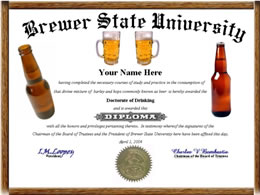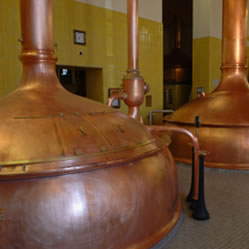The U.S. beer industry is in a constant state of flux. New ideas and innovations are changing the face of beer every year, especially in the micro brew market. As the primary field of growth in the brewing industry, kegerators.com will name the top ten names in domestic craft beer production. These are names to look out for. These are brewers associated with quality, ingenuity, tradition, social responsibility, and most of all, good tasting beer. For these qualities, we name New Belgium Brewing Company (Fort Collins, Colorado), Dogfish Head Brewing Company (Rehoboth Beach, Delaware), Spoetzl Brewery (Shiner, Texas), Rogue Ales (Newport, Oregon) and St. Arnolds Brewery (Houston, Texas).
![]() New Belgium Brewery of Fort Collin, Colorado, is here honored for the company’s integrity, ingenuity, and the amazing quality of its high production level brewery. A forward thinking, 100% green company which shares its profits with its workers, New Belgium has consistently contributed innovative brewery techniques, while at the same time maintaining ancient and venerated beer traditions, such as its 1554 Enlightened Black Ale. Kudos to the first beer company to recycle its waste grain and harvest methane from it! This full circle renewable energy source now contributes 30% of the energy required to produce over 450,000 barrels of beer annually.
New Belgium Brewery of Fort Collin, Colorado, is here honored for the company’s integrity, ingenuity, and the amazing quality of its high production level brewery. A forward thinking, 100% green company which shares its profits with its workers, New Belgium has consistently contributed innovative brewery techniques, while at the same time maintaining ancient and venerated beer traditions, such as its 1554 Enlightened Black Ale. Kudos to the first beer company to recycle its waste grain and harvest methane from it! This full circle renewable energy source now contributes 30% of the energy required to produce over 450,000 barrels of beer annually.
![]() Dogfish Head Brewing Company, a smaller brewer located in Rehoboth Beach, Delaware, is here honored for ingenuity and fearless experimentation in the realm of brewing. These brewers have gone where few dare to go, preparing beers of up to 18% A.P.V.! Using admixtures such as raspberries, raisins, blueberries, chicory, and coffee, Dogfish Head has prepared some mighty interesting and mighty tasty concoctions. Brewers of the Midas Touch, Dogfish Head has even created a facsimile of a brew scientists discovered only traces of on urns in King Midas’ tomb. A true blend of tradition and experimentation. But you’ll have to go to Delaware to sample some of their latest innovations: small scale craft spirits!
Dogfish Head Brewing Company, a smaller brewer located in Rehoboth Beach, Delaware, is here honored for ingenuity and fearless experimentation in the realm of brewing. These brewers have gone where few dare to go, preparing beers of up to 18% A.P.V.! Using admixtures such as raspberries, raisins, blueberries, chicory, and coffee, Dogfish Head has prepared some mighty interesting and mighty tasty concoctions. Brewers of the Midas Touch, Dogfish Head has even created a facsimile of a brew scientists discovered only traces of on urns in King Midas’ tomb. A true blend of tradition and experimentation. But you’ll have to go to Delaware to sample some of their latest innovations: small scale craft spirits!
![]() Spoetzl Brewery, of Shiner, Texas, is a middle-sized brewery (much bigger than a microbrewery at 300,000+ barrels per year) that has, just in recent years, ventured into the craft beer market. Spoetzl is here honored for returning to the craft beer traditions from the precipice of the homogenized U.S. beer fad. For many years, the Spoetzl Brewery kept mainly their Shiner beer going, but now has distribution for many craft beers, in addition to their rather main-stream tasting Shiner and Shiner light. All of this is, in part, to Shiner’s centennial beer program, which started in 2005. The centennial program began producing one special edition beer in small batches at the end of each quarter. With this foray into the realm of experimentation, the brewers at the Spoetzl Brewery found flavors that were received quite favorably. Spoetzl’s Shiner 96 Märzen Ale, Shiner 97 Bohemian Black Lager, Shiner 98 Bavarian Style Amber, and Shiner 99 Munich Style Helles Lager, are all high quality craft beers worthy of recognition along-side the best microbrews of the day.
Spoetzl Brewery, of Shiner, Texas, is a middle-sized brewery (much bigger than a microbrewery at 300,000+ barrels per year) that has, just in recent years, ventured into the craft beer market. Spoetzl is here honored for returning to the craft beer traditions from the precipice of the homogenized U.S. beer fad. For many years, the Spoetzl Brewery kept mainly their Shiner beer going, but now has distribution for many craft beers, in addition to their rather main-stream tasting Shiner and Shiner light. All of this is, in part, to Shiner’s centennial beer program, which started in 2005. The centennial program began producing one special edition beer in small batches at the end of each quarter. With this foray into the realm of experimentation, the brewers at the Spoetzl Brewery found flavors that were received quite favorably. Spoetzl’s Shiner 96 Märzen Ale, Shiner 97 Bohemian Black Lager, Shiner 98 Bavarian Style Amber, and Shiner 99 Munich Style Helles Lager, are all high quality craft beers worthy of recognition along-side the best microbrews of the day.
![]() Rogue Ales, of Newport, Oregon is a brewery which has maintained an exacting level of perfection with its recipes while keeping an open mind toward new innovations in brewing. With brews as diverse as Soba, Hazelnut Brown Nectar, and the Juniper Pale Ale, Rogue has demonstrated it’s willingness to live up to its namesake. Yet still, for all this invention, Rogue beers are remarkably reliable – one bottle will always taste like the next, even with such extreme different flavors. Here’s another great thing about Rogue Ales: they are all without preservatives or pasteurization.
Rogue Ales, of Newport, Oregon is a brewery which has maintained an exacting level of perfection with its recipes while keeping an open mind toward new innovations in brewing. With brews as diverse as Soba, Hazelnut Brown Nectar, and the Juniper Pale Ale, Rogue has demonstrated it’s willingness to live up to its namesake. Yet still, for all this invention, Rogue beers are remarkably reliable – one bottle will always taste like the next, even with such extreme different flavors. Here’s another great thing about Rogue Ales: they are all without preservatives or pasteurization.
![]() Saint Arnold Brewing Company, of Houston, Texas, is here honored for their dedication to serving their community with traditional, well made craft beers. You may not have heard of St. Arnolds unless you have visited central or east Texas. This is because St. Arnolds is more devoted to serving their immediate community than they are in expanding their distribution. St. Arnolds certainly stands a part from the other breweries in this list, being a straight-forward craft brewery with an honorable dedication to traditional beer styles. St. Arnolds has had quite a time dealing with the destruction of Hurricane Ike, but they are moving into a new location and will surely be up and running again soon.
Saint Arnold Brewing Company, of Houston, Texas, is here honored for their dedication to serving their community with traditional, well made craft beers. You may not have heard of St. Arnolds unless you have visited central or east Texas. This is because St. Arnolds is more devoted to serving their immediate community than they are in expanding their distribution. St. Arnolds certainly stands a part from the other breweries in this list, being a straight-forward craft brewery with an honorable dedication to traditional beer styles. St. Arnolds has had quite a time dealing with the destruction of Hurricane Ike, but they are moving into a new location and will surely be up and running again soon.
These have been Kegerators.com‘s five most distinguished domestic brewers of 2008.




